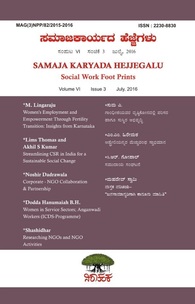|
The July issue of Samajakaryada Hejjegalu (Social Work Foot Prints) has a collection of useful articles starting with Dr. Lingaraju’s “Women’s Employment and Empowerment Through Fertility Transition: Insights from Karnataka.” This article discusses the trends in work participation of women in rural and urban Karnataka, as influenced by declining fertility rate. It also discusses the various facilitating factors promoting greater participation of women in work. The article throws light on the miserable condition of women from lower castes and classes, who are working in blue collar service sector for low wages and uncertain job tenure with no security – personal or financial. In the article “Streamlining CSR in India for a Sustainable Social Change”, Mr. Lims Thomas and Mr. Akhil S Kumar states that the professional social workers employed in the corporate sector have to identify core competencies of the company and also should ensure that the CSR activities. They also explain the corporate social responsibility in India and various roles of social workers in CSR. They say that more significance is given to the contribution of professional social workers in coordinating the CSR activities of the companies in terms of assuring the sustainability of the implemented programme. Through this article, the authors explain how that the social workers can play a pivotal role in changing the scenario of the future CSR activities and their role therein.
Noshir Dadrawala’s article “Corporate – NGO Collaboration and Partnership” discusses the Legal, Fiscal & Tax aspects of NGOs, collaboration of voluntary organizations and grant-making foundations/corporations. Dr. Dodda Hanumaiah, in his research based article “Women in Service Sectors; Anganwadi Workers (ICDS-Programme)-A Sociological study in Madhugiri Taluk” describes the socio-economic status, problems and challenges of Anganwadi Workers (AWWs) in Integrated Child Development Services (ICDS) Programmes in Madhugiri taluk, Tumkur district of Karnataka. Dr. Shashidhar C, in his article “Researching NGOs and NGO Activities” has emphasized the necessity of research and understanding of NGO’s for the efficient functioning. He clearly explains the important features of NGOs and also the difference between a Business Organization and an NGO in terms of their functioning, features, principles and objectives. The Kannada section of the Journal has a note on “Mudra Yojana” and a book review of “Legal Information for Common People” besides the other three articles. Suma. A, in her article “Gandhiji’s Perspective on Environment and Sustainable Development” explicates that Gandhiji was not only a political leader, freedom fighter, social reformer, and philosopher but also an environmentalist. This article also explains that in India the basic concepts of many of the environmental movement’s are influenced by the Gandhian thoughts. M.M. Hiremat in his article “Appreciable Self Esteem of Australians” described about the richness of Australia in terms of their truthiness, loyalty, righteousness, noble feeling, and determination towards harmonious relationship with other nations. This article also explains about the social life, administrative systems and geographical boundaries of the Australia. Dr. C.R. Gopal is writing a book on Community Organisation (Samudaya Sanghatane) in Kannada. The first chapter deals with the concept and the characteristics of ‘Community’ and the definitions given by Prof. Murray G. Ross, Prof. Aurthur Danham etc are explained. Secondly, the characteristics of a Community are listed out. The introductory portion of the first chapter is given in this edition for the benefit of MSW students. M.H. Ramesha |
Categories
All
Social Work Learning Academy50,000 HR PROFESSIONALS ARE CONNECTED THROUGH OUR NIRATHANKA HR GROUPS.
YOU CAN ALSO JOIN AND PARTICIPATE IN OUR GROUP DISCUSSIONS. MHR LEARNING ACADEMYGet it on Google Play store
|
SITE MAP
SiteTRAININGJOB |
HR SERVICESOTHER SERVICESnIRATHANKA CITIZENS CONNECT |
NIRATHANKAPOSHOUR OTHER WEBSITESSubscribe |
MHR LEARNING ACADEMY
50,000 HR AND SOCIAL WORK PROFESSIONALS ARE CONNECTED THROUGH OUR NIRATHANKA HR GROUPS.
YOU CAN ALSO JOIN AND PARTICIPATE IN OUR GROUP DISCUSSIONS.
YOU CAN ALSO JOIN AND PARTICIPATE IN OUR GROUP DISCUSSIONS.
|
|







 RSS Feed
RSS Feed





